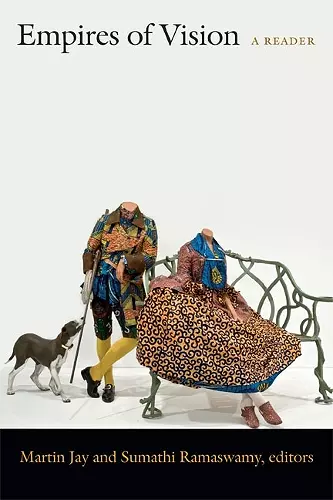Empires of Vision
A Reader
Sumathi Ramaswamy editor Martin Jay editor
Format:Paperback
Publisher:Duke University Press
Published:14th Mar '14
Currently unavailable, and unfortunately no date known when it will be back

Combining visual culture and postcolonial studies, this reader shows that an appreciation of the role of visual experience is necessary for understanding how colonialism worked and how colonized subjects spoke to imperial rulers.
Empires of Vision brings together pieces by some of the most influential scholars working at the intersection of visual culture studies and the history of European imperialism. The essays and excerpts focus on the paintings, maps, geographical surveys, postcards, photographs, and other media that comprise the visual milieu of colonization, struggles for decolonization, and the lingering effects of empire. Taken together, they demonstrate that an appreciation of the role of visual experience is necessary for understanding the functioning of hegemonic imperial power and the ways that the colonized subjects spoke, and looked, back at their imperial rulers. Empires of Vision also makes a vital point about the complexity of image culture in the modern world: We must comprehend how regimes of visuality emerged globally, not only in the metropole but also in relation to the putative margins of a world that increasingly came to question the very distinction between center and periphery.
Contributors. Jordanna Bailkin, Roger Benjamin, Daniela Bleichmar, Zeynep Çelik, David Ciarlo, Natasha Eaton, Simon Gikandi, Serge Gruzinski, James L. Hevia, Martin Jay, Brian Larkin, Olu Oguibe, Ricardo Padrón, Christopher Pinney, Sumathi Ramaswamy, Benjamin Schmidt, Terry Smith, Robert Stam, Eric A. Stein, Nicholas Thomas, Krista A. Thompson
"Empires of Vision is one of those books that had to be written, and that required, not a single author, but an interdisciplinary and cosmopolitan collective of scholarly learning and critical passion. In a brilliant series of interventions, the authors gathered here survey the full range of ways in which imperialism worked its black magic, not just with the standard tools of armies and military technologies, bureaucracies and gunboats, but with photographs, paintings, maps, and the whole range of visual arts and media. This is essential reading for art historians, anthropologists, and scholars of visual culture across the globe."—W. J. T. Mitchell, author of Seeing Through Race
"The culture of empire has been assessed and analyzed most frequently on the evidence of its 'writings.' It is the inscriptive archives of law, literature, anthropology, history, and theology, amongst others, that have dominated our view of the representational conditions and ideological commitments that prevail in colonial societies. But empire was a potent apparatus for looking, viewing, and gazing—an act of surveillance, an art of regulation, and a profound shaper of visual culture. No collaboration could be as fruitful as the shared spirits of Martin Jay and Sumathi Ramaswamy, who serve as our gifted cicerones in the world of empire's seeing. They have gathered together some of the most important essays that explore the visual domain of empire's rule and misrule, and their anthology will have a transformative effect on art history, the history of ideas, and postcolonial studies."—Homi K. Bhabha, Anne F. Rothenberg Professor of the Humanities, Harvard University
“Duke University Press has done social visionaries a real service by printing Martin Jay and Sumathi Ramaswamy’s massive collection of insightful articles unveiling how the very way we see the world is daily shaped by ‘pictorial practices, image-making technologies, and vision-oriented subjectivities’ that have been ‘entangled in empire-building, nationalist reactions, post colonial contestations, and transnational globalization.’ It is not just economic or military power that shapes the way we see the world, but also photographs, paintings, maps, and the whole range of visual arts and media that are scrutinized in this collection.” * Tikkun *
“The power of Empires of Vision is in its trans-disciplinary scope, but is also in its ambition. The themes and essays come together and prod the reader to consider the multi-dimensionality of image and empire. It moves beyond mere collections and museums; it moves beyond observed and observer. Empires of Vision examines the nature of empire through oft-forgotten and frequently overlooked historical characters.” -- Lydia Pyne * Somatosphere *
"An essential contribution to an ever-expanding field of investigation as much as it is fascinating reading." -- Sandra Marques * Social Anthropology *
"The volume...comprises a sound and valuable anthology of established research on visual culture, Empire, and the postcolony. As most of these contributions have become or are on the way to becoming canonical works, Empires of Vision is exactly that — 'a reader.' As such, it is a valuable contribution to the field, and a useful text for those teaching undergraduate and graduate courses on visual culture, imperialism, and postcolonialism." -- Stephen Sheehi * Canadian Journal of History *
ISBN: 9780822354482
Dimensions: unknown
Weight: 1048g
688 pages